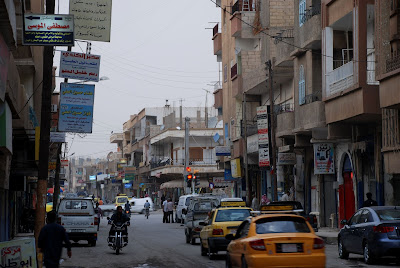Real hope for the anti-Assad coalition?
 |
| Central Raqqa. CC Betramz, October 2009 |
For years, the warring factions in Syria have been divided (somewhat arbitrarily) into three broad groups: Forces supporting the Syrian regime of Bashar al-Assad (backed by Russia and Iran), rebels against Assad (backed by the US, Turkey, Saudi Arabia, and others, to varying degrees), and IS and the unofficial al-Qaeda (AQ) affiliate Jabhat Fateh al-Sham (JFS) (formerly Jabhat al-Nusra or the Nusra Front). In reality, the lines between these three groups are blurry, to say the least, and groups like IS and JFS actually fight each other, even as there is cooperation across those blurred lines. With those three groupings and their backers all fighting each other, and with American support for the rebels very limited, there has long been no path to victory for any side. Possibly until now.
If Raqqa falls to Western-backed rebels, with Lieutenant General Stephen Townsend saying forces will move "soon" to isolate the city and Turkey wishing to get involved, the situation will change dramatically. A three-party war will begin to look like a two-party one. Much would remain to be sorted out among the coalition supporting the rebels, not least the fact that the US supports Kurdish militias, which make up a large portion of the fighting power on the ground, while Turkey considers them terrorists. Nevertheless, the dynamics would shift in favor of the rebels for the first time in years. The rebels have long looked unable to battle both IS and Assad and they were getting pounded by both. Many in their ranks even decamped to IS, as plenty of Sunnis consider it the lesser evil compared to Assad. If Raqqa falls, consolidating IS's string of territorial losses, there will potentially be a large number of recruits still keen to battle Assad who could then join the rebel forces.
So far, the US has done only the minimum to support the rebels. If they appeared to be gaining enough strength to take Syria on their own, however, America, especially under a President Clinton, might be willing to provide extensive—albeit risky—air support. After years in which it seemed inevitable that Assad would cling to power, a change in the tide may be in the offing.


Comments
Post a Comment